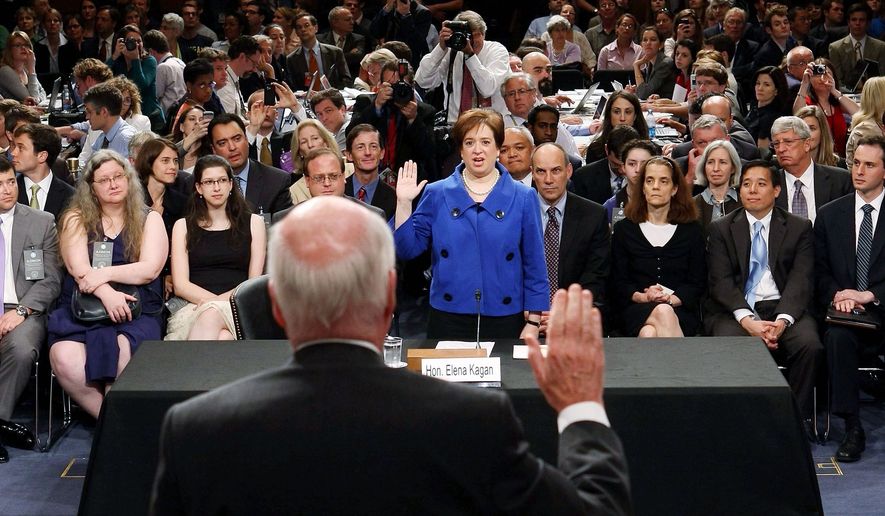Supreme Court nominee Elena Kagan on Monday pushed back at Republican accusations that she is liberal ideologue, telling Congress that if confirmed she would consider every case “impartially, modestly” and “in accordance of the law.”
Ms. Kagan, while addressing the Senate Judiciary Committee in the first day of what was expected to be a weeklong hearing, stressed that she would take an “even-handed” approach and would consider all sides of an argument if confirmed. Her almost 13-minute speech was peppered with such words and phrases as “restraint,” “open minded,” “principle” and “impartiality.”
Ms. Kagan, 50, is the first woman to hold the post of U.S. Solicitor General, the federal government’s top litigator before the Supreme Court. She also was the first woman to serve as dean of Harvard Law School, and she served as an adviser in the Clinton administration.
She said her experience as an educator, in government and the private sector would serve her well serving on the nation’s highest court.
“The Supreme Court is a wondrous institution. But the time I spent in the other branches of government remind me that it must also be a modest one - properly deferential to the decisions of the American people and their elected representatives,” she said.
Ms. Kagan, dressed in a blue suit similar to one worn by fellow Obama administration Supreme Court nominee Sonia Sotomayor, who was confirmed last year, touted the retiring Justice John Paul Stevens, who she would replace if confirmed.
“His integrity, humility and independence, his deep devotion to the court, and his profound commitment to the rule of law - all these qualities are models for everyone who wears, or hopes to wear, a judge’s robe,” she said.
She also praised the courts’ first two female justices, Sandra Day O’Connor and Ruth Bader Ginsburg, saying that they “paved the way for me and so many other women in my generation.”
“Elena Kagan earned her place at the top of the legal profession. Her legal qualifications are unassailable,” said committee Chairman Patrick J. Leahy, Vermont Democrat.
But Republicans portrayed her as a “political lawyer” who has associations with “activist” judges.
“A review of the material produced by the Clinton Library shows that you forcefully promoted liberal positions and offered analyses and recommendations that often were more political than legal,” said Sen. Charles E. Grassley, Iowa Republican.
Sen. Jeff Sessions of Alabama, the committee’s ranking Republican, expressed uneasiness that Ms. Kagan never has tried a case before a jury and only argued her first appellate case a few months ago.
“While academia certainly has value, there is no substitute, I think, for being in the harness of the law, handling real cases over a period of years,” he said.
Democrats downplayed her lack of judicial experience, portraying her as having a balanced resume that would provide a much needed perspective to the court.
“Frankly, I find this refreshing,” said Sen. Dianne Feinstein, California Democrat.
Sen. Charles E. Schumer, New York Democrat, said the solicitor general was the “right person for the right time.”
“What General Kagan does bring to the table is unprecedented practical experience,” he said. “General Kagan is simply a terrific antidote to the lack of practical, real-world understanding of the court.”
Democrats frequently pointed out that about a third of all justices had no prior judicial experience, including former Chief Justice William H. Rehnquist, first named to the court by President Nixon.
Sen. Orrin G. Hatch, Utah Republican, said he wasn’t bothered that the nominee had not served as a judge. But he said that unlike other Supreme Court judges without bench experience, Ms. Kagan has little private law practice experience, having instead spent most of her career in academia and politics.
“The value of such experience depends on whether you view the Supreme Court as a political circus or view its role as crafting policy,” Mr. Hatch said.
Republicans also raised concerns that Ms. Kagan, while head of the Harvard Law School, prohibited military recruiters in protest over the Pentagon’s policies on gays.
“I can’t take this issue lightly,” Mr. Sessions said.
With Monday’s opening statements finished, senators will begin questioning Ms. Kagan directly beginning Tuesday morning.
• Sean Lengell can be reached at slengell@washingtontimes.com.




Please read our comment policy before commenting.